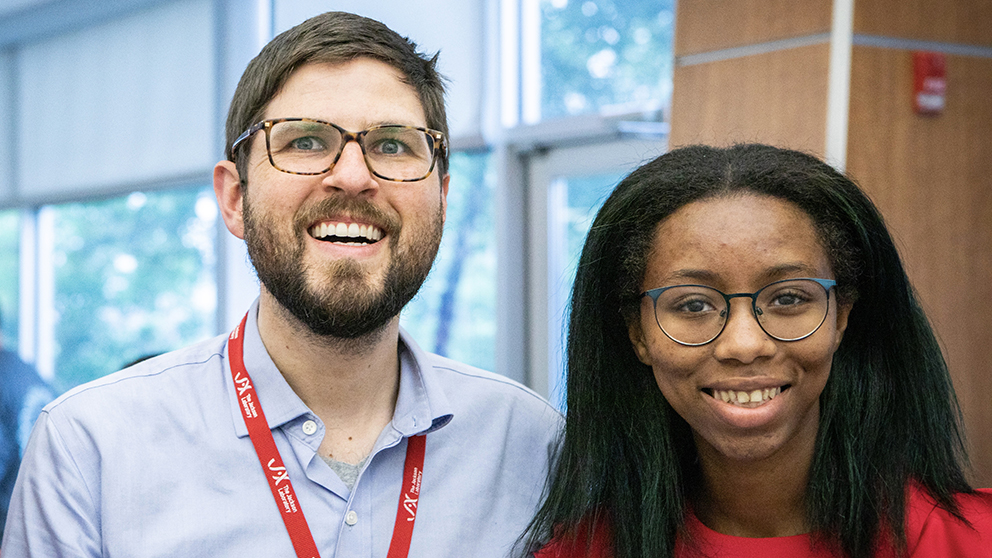
Violet Kimble with Michael Saul, Ph.D., her postdoctoral mentor, pictured at the 2019 Summer Student commencement ceremony.
Violet Kimble served as a Research Assistant in Professor Elissa Chesler’s Lab during the 2019 Summer Student Program. Now in her second year of graduate school at Yale University and studying the neuroscience of addiction, she reflects on the role of her JAX mentors in building her confidence as an underrepresented woman in science.
As she finished her sophomore year at Drew University, Violet Kimble knew she wanted to devote her summer to an intense, immersive scientific research environment. She knew The Jackson Laboratory’s Summer Student Program was her top pick. Beyond that, she did not know what to expect when she arrived in Bar Harbor in the summer of 2019.
She had enrolled at Drew intending to study biochemistry with a specific interest in drug development, but ultimately found the field of neuroscience more interesting.
“I am fascinated by this idea that all humans have brains and yet we know so little about them,” Violet says. “In the field of neuroscience, I thought I might have an opportunity to grow, especially because it is always changing and evolving. And in that environment, maybe I could discover something new.”
Making a Difference in Addiction Research
At JAX, Violet paired with mentors Elissa Chesler, Ph.D. the Ann Watson Symington Chair in Addiction Research, and computational scientist Michael Saul, Ph.D. The Chesler Lab investigates the genetics underlying behavior, specializing in the genetic roots of addiction and Substance-Use Disorder (SUD). With the resources available to her at JAX, Violet found herself engaged in a deeper level of addiction research, using bioinformatics to interpret and capture biological data in a more meaningful way.
It was through these research techniques that she first learned of the biological discrepancies between male and female addiction behaviors, which became the cornerstone of her research identity. She learned biological females, for example, tend to escalate their drug use faster, are more prone to self-harm, and experience relapses differently than males do. Violet was particularly moved by accounts of biological mothers who felt intense guilt after birthing addicted babies.
“I couldn’t imagine a mother would put herself and her baby through that experience unless the addiction was incredibly challenging to overcome,” she says. “And I want to help find solutions for that.”
Through her ongoing research, Violet hopes to develop a better understanding of ovarian hormones on substance-use behavior, and to cultivate better drug models than those we have now.
“I want to help create a behavior paradigm that more closely mimics people’s real-world experience with Substance-Use Disorder. I would love to be part of a treatment discovery that helps biological women mediate their addiction and targets their unique challenges. I want to reduce the stigma of addiction and make it easier for them to maintain their sobriety.”
Confidence, Community and Life After JAX
Throughout the summer, Violet says the encouragement and support from Chesler and Saul was invaluable in helping her build her confidence as a woman in science from a historically underrepresented demographic.
“Elissa and Michael encouraged me from day one and gave me an exciting confidence boost,” she says, noting that Chesler, in thinking about Violet’s trajectory, encouraged her to apply for a postdoctoral position in the lab. “Just knowing Elissa believed I was capable of working alongside her in her lab was incredibly motivating.”
Now in her second year of graduate school at Yale University, Violet continues to build on the foundation of research she established at JAX. She joined the laboratory of Dr. Nii Addy, associate professor of psychiatry at the Yale School of Medicine and leading neuroscientist who studies the neurobiological basis of substance use disorders, depression and anxiety. Violet is working with Addy to understand L-type calcium channels in social behavior and its modulation by ovarian hormones mediating substance use.
She was also accepted to the Society for Neuroscience’s Neuroscience Scholars Program, an award-winning two-year training program for underrepresented graduate students and postdoctoral researchers to enhance their careers and build community, and was concurrently accepted to the Summer Program in Neuroscience, Excellence and Success (SPINES) in Woods Hole, MA. This past summer, she had the opportunity to present her research at the Gordon Research Conference (GRC) on Neurobiology of Drug Addiction, a five-day event that invited researchers from around the world to present their findings at the forefront of addiction research.
In reflecting on her experience in the JAX SSP, Violet offers advice for other underrepresented scientists.
“Surround yourself with people who believe in your success,” she says. “Make sure you are working with people who feel good about having you on their team and are not just tolerating you.”
And, she says, don’t be afraid to approach others whose careers you admire. “Seek people out," Violet says. "Send that email and ask about the programs, scholarships or conferences they have experienced and that you are considering. People are so often willing to share their knowledge, if you only have the courage to ask.”